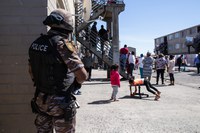Don’t politicise our grief, moms warn SAPS and politicians
Some women representing various community organisations last week called on the police and political leaders to include them in decisions on safety in their communities especially implementing the police’s anti-gang strategy. “We need to be taken seriously,” founder of the organisation Moms Move for Justice Avril Andrews told Parlybeat in an interview. Andrews started the organisation to support grieving mothers who lost children in gang violence. For the past three years the mothers marched to Parliament and the provincial legislature to highlight the impact of gang violence. “Politicians and police should take their political hats off and just be human beings. They can’t just write people off to die for years and then before elections play politics. Our lives and the lives of our children matter.” Andrews lost her son, Alcardo in 2015. He was shot two houses from where they live. “It is a matter of life and death every day here with all the senseless killing. Our communities are filled with broken mothers and fatherless children.” Andrews welcomed the anti-gang units but said people still live in fear. “They will have to include us and keep communication channels open.”
Yet according to the police who recently briefed MPs in Parliament the anti-gang units are making progress in communities. National Police Commissioner Lieutenant-General Khehla Sithole told MPs in Parliament’s Portfolio Committee on Police there is a new community policing strategy with the aim of bringing police closer to communities. Head of strategic management in SAPS Major-General. Leon Rabie told MPs 66 gang ringleaders have been profiled and a total of 889 cases opened of which 441 are still under investigation and 448 are in court. Rabie also told MPs 77 firearms were confiscated and 221 arrests made in the Western Cape. According to Sithole R10 million was allocated for the anti-gang units. There are 1193 police members and 89 vehicles allocated to these units. But an activist affiliated to the Western Cape Safety Forum Latifah Jacobs dismissed the statistics as not good enough especially after another flare-up of gang shootings in Bonteheuwel and Mitchells Plain. She told Parlybeat the impact of these anti-gang units is clearly not yet felt by communities. A total of 18 people were reportedly killed in gang violence in Bonteheuwel and at least 25 in Lentegeur, Mitchells Plain since the beginning of the year. President Cyril Ramaphosa and police minister Bheki Cele launched the anti-gang unit in November last year. According to Jacobs the visibility of the gang unit is also not consistent. “It feels like they do one operation one day and then its followed by days of nothing. Then the shooting starts again.” Jacobs said policing at different levels of government should work together. “Metro police and SAPS should take hands because our communities suffer whilst they fight among themselves.”
Leslie Wyngaard, a mother who like Andrews lost her son in a gang shooting, told Parlybeat the anti-gang unit is a good initiative that is to be welcomed. “And yes, they are arresting people, but it is not making a real difference yet. There is still shooting, and killings and the violence has not really stopped.” She also bemoaned the lack of communication between the police and victims of gang violence. “It is very frustrating for mothers who already feel hopeless. There is often no feedback on cases. Some mothers wait for over three years to get any movement on their children’s cases. In my son’s case, I didn’t even know the case was provisionally withdrawn.” Wyngaard proposed that regular feedback to the family of slain victims be made part of a performance agreement of officers working on these cases so they are held accountable.
This week's articles
Glitches in online system adding to NPOs’ woes
Calls for policy certainty on undocumented learners

